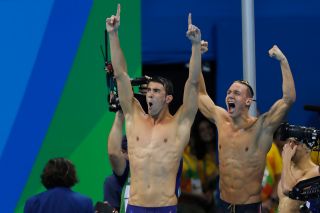Stress
When Forcing Yourself Doesn't Work Anymore
Aligning with our physiological reactions to the pressures to perform.
Updated April 8, 2024 Reviewed by Monica Vilhauer
In July 2023, during his first public appearance with the press in nearly a year, Caeleb Dressel explained why he shocked the world by abruptly withdrawing in the middle of the 2022 World Aquatics Championships having already won two gold medals. Without any comment, scratching mid-meet, Caeleb disappeared from swimming altogether when considered to be the next Michael Phelps and at the peak of his career.

Caeleb reflected on what happened by saying, “It all came boiling up, so I really didn’t have a choice. I used to pride myself in being able to shove things down and push things aside and plow through. It worked for a very long time in my career. I got results in 2017, 2019, and 2021 until I couldn’t do that anymore. So it’s a very strange feeling because I am usually really good at that.”
This is a poignant, albeit tragic articulation of what we see playing out not only in sport, but all around us including in business and education, in communities and families, and rippling throughout all ages and stages of life. Caeleb’s intense reflection on shoving things down and plowing through actually compounds the problem.
The pressure to perform is real. We live, learn, work, and play in a culture of competition, evaluation, and rapid, unpredictable change. In essentially every role that we play within this human race, we face a pressure to perform to a certain standard or expectation. As if this weren’t enough, we are expected to appear with effortless grace, confidence, mastery, and flow.
Whether we are trying to show our third-grade teacher that we’ve mastered our math tables; we're delivering thoughtful, articulate, and confident answers in an interview; we're trying out for a spot on a collegiate volleyball team; or we're hoping for a “swipe right” on a dating app, we are expected to achieve something. However, from our biology’s perspective: evaluation, competition, unpredictable change, and the constant challenge of having to perform to a standard and meet expectations are risky, uncertain, overwhelming, and at times, life-threatening.
At age 17, Caeleb became the youngest swimmer ever to clock under 19 seconds in a 50-yard freestyle event. He describes falling short of that record in his next race—the crowd sighing in disappointment, their expectations of him to continue breaking records, and a keen feeling of being a source of entertainment for the first time in his life.
This story is Caeleb’s brain making meaning of his bodily reactions to the pressure to perform. He describes the pressure and expectation as coming at him from the outside, however his experience of this pressure occurs from inside his own body.
The pressure we feel within is reflexive, adaptive, and beneath conscious control. These physiological shifts follow a predictable pattern grounded in our evolution. When the pressure builds, some of us lock in, fight back, and attack. Some of us run, hide, and play it safe. Some of us give up, withdraw, or disappear altogether. These aren't flaws in character, signs of weakness, a lack of commitment, or deliberate decisions, but adaptive survival responses triggered by our very primitive survival networks embedded in our DNA.
Yet, despite our unique genetic predispositions, these shared survival tactics are hardwired into our brain, body, and nervous system. It is important to note that our reactions to pressures are driven by physiological states, not fixed traits that predetermine our capacity to perform, our resilience to adversity, or our destiny.
As Caeleb demonstrates, when we make a habit of ignoring, pushing through, or repressing how our body is feeling, we will eventually pay a price, whether it’s burnout, injury, fatigue, unhealthy coping strategies, chronic anxiety, or debilitating depression.
Expectations from the world around Caeleb, and the psychological pressures of having to perform that he admits to putting on himself, were the driving forces behind his dedication to being the best. Caeleb’s grit, determination, and relentless commitment to every aspect of the intensive program he followed enabled him to become the best.
This is one aspect of the pressure paradox. The pressure that motivates us to become the best is the same pressure that breaks us apart.
Surprising as it may sound, Caeleb wasn’t aligned with his physiology, and his physiology wasn’t aligned with the stories he was telling himself and the public. Instead of meeting his body where it was, Caeleb kept driving forward and forcing his body to go faster, follow the script, and cooperate. Until that didn’t work anymore.
The right amount of pressure with the right amount of recovery can elevate our performance and enhance our resilience, but only when the pressure doesn’t overwhelm our physiological capacity to manage the challenge. Only when our body is operating from a baseline of physiological safety can resilience increase and be sustained.
Functionally, any challenge to our physiological safety is an interruption of the neural mechanisms and metabolic processes within our bodies that would otherwise support health, growth, and recovery. A body locked in a state of threat would therefore compromise the neural feedback loops supporting homeostasis and chronically divert metabolic resources toward attacking, defending, or protecting.
In our cultural quest for money, power, status, and stuff, we celebrate grit, determination, willpower, drive, achievements, and success. We often define resilience as getting back up after being knocked down. We rally behind leaders and champions in business and sport who pride themselves in their ability to shove things down and plow through, not letting people, events, or feelings get in the way of winning and achieving.
But these celebrated traits are misaligned with our biology. These behaviors align more closely with a body in a state of threat and struggling to survive. It is only when we don’t feel safe enough that we must attack, defend, or protect. It is only when we don’t feel resourced enough that we must fight for what we want, defend what we already have, or protect what we are afraid to lose.
Resilience isn’t getting back up to fight again, taking what we want, or winning at any cost. Resilience is navigating the pressure to perform in an entirely different way, by aligning with our physiology—not shoving things down, plowing through, or fighting against what shows up. Resilience is playing when we might otherwise attack, defend, or protect, and ultimately supporting our performance as the pressure builds. Resilience is tapping into who we really are when the world around us is uncertain, chaotic, evaluative, competitive, and expecting us to do better.
The organizing principles embedded in Polyvagal Theory help us to understand Caeleb’s experience. When our bodies are triggered into an adaptive, reflexive state of threat, our underlying physiology changes. This compromises our way of solving problems, and our ability to hold different perspectives, manage emotions, and relate with others. Constant states of threat interfere with our resilience and ability to heal, recover, and perform, no matter what we think or tell ourselves.
After Caeleb’s second meet in July 2023, his journey back into competitive swimming, and his quest to make the 2024 Olympic Team, he was quoted as saying, “There’s a difference between racing scared because you don’t want to embarrass yourself, and actually enjoying racing!” According to Stephen W. Porges, Ph.D., the developer of the theory, our default state is safety, not threat. When we feel safe, we can be who we really are, which is kind, benevolent, compassionate, caring, and cooperative.
When we feel safe, we can share our authentic voice, go after our dreams, open up to one another, and free ourselves of the shame, blame, guilt, and embarrassment of falling short. When we feel safe, we can navigate the pressures to perform, share the truth of how we are feeling, come together, and enjoy more of this human race!
Caeleb speaks of finding this state and racing for the joy of it. Time will tell us if his body believes that to be true. The pressure to perform is real. But so, says Porges, is our “biological need to feel safe.”
References
Swimswam, & Youtube. (2022). Caeleb Dressel Talks to Press for First Time Since 2022 Worlds (FULL INTERVIEW). https://youtu.be/H4Uj-44e5vI?si=G0htDtAA4qkP4cBZ
Graham Bensinger, & Youtube. (2022). Caeleb Dressel on mental health struggles. https://youtu.be/5XToAFefAy8?si=XenFx48SASuR-9yZ




